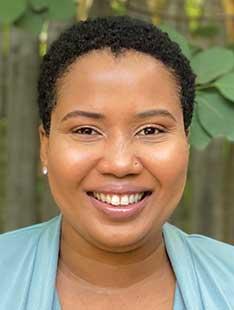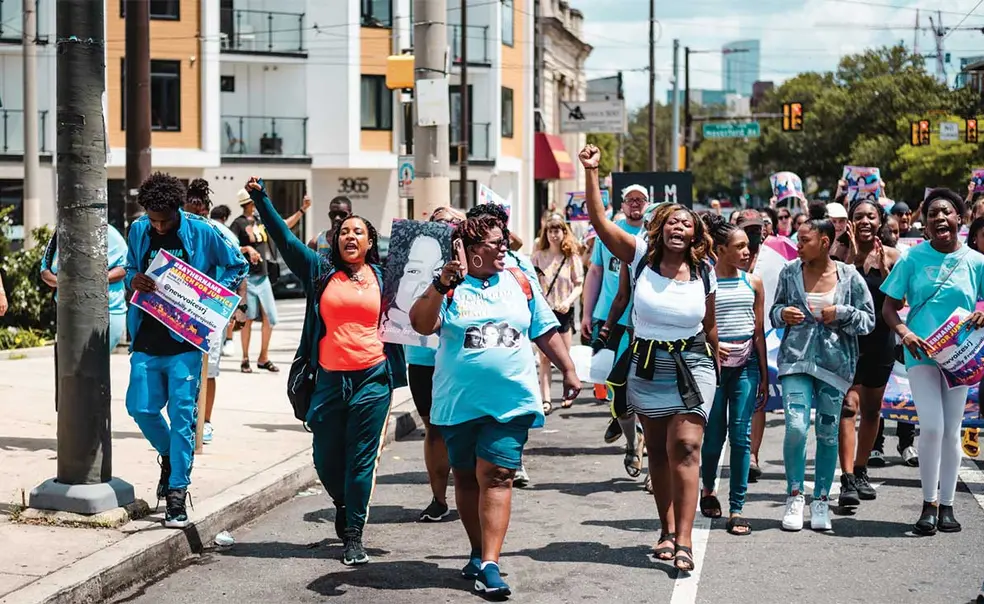Alumni and Students Raise Awareness at Reproductive Justice Event
‘Abortion impacts almost every facet of society,’ says Kelly Davis ’05
Kelly Davis ’05 is used to speaking to people about abortion. As executive director at New Voices for Reproductive Justice based in Pennsylvania and Ohio, one facet of her job is to educate people about racism, misogyny, and other means of oppression that restrict health and well-being for Black people who can get pregnant.
On Oct. 22, she gave the keynote address at a place she credits with radicalizing her: Princeton University.

Davis was one of a handful of alumni who spoke at the Princeton Virtual Panel & Fundraiser for Reproductive Justice of the work they are doing. The event was put together by a group of alumni who had been organizing around racial justice since 2020, and Princeton Progressives.
“People care about this. They want to talk about it, so why not try to get people to do more than just talk?” says Benjamin Levenson ’13, deputy director of the nonprofit Justice Is Global, and one of the event organizers. The June Supreme Court decision in Dobbs v. Jackson Women’s Health Organization that abortion is not a constitutional right prompted them to create an event focused on abortion. The best people to speak at such an event, the group knew, were the alumni already involved.
That included Brooke Lansing ’14, who is currently working on a history Ph.D. at Johns Hopkins University with a focus on abortion and contraception. She spoke on abortion from the 1830s to 1850s, and connected women’s stories from then to people who can get pregnant today. “It’s a very normal thing for people to want to control their reproduction,” she says. “Being able to have some say over how big their family is or what their own body goes through is something modern people can resonate with, and is a really critical issue of reproductive rights and justice.”
Davis started her talk by reflecting on Princeton, where she was the only Black peer educator at the time and “saw the way the University failed to protect particularly women,” she says. In her role as a peer educator and student advocate, she pushed for changes at the McCosh Health Center, and knew that students did become pregnant, but didn’t stay that way. “The reason was abortion, but it was very hush-hush and not talked about,” she says. “People were scared to be stigmatized.”
Davis thought she wanted to get a Ph.D., but her senior thesis adviser steered her toward advocacy, telling her “you don’t want to study the past, you want to change the future.”
In her talk, she also stressed that reproductive justice as a movement isn’t new — it was started by 12 Black women in 1994. It’s also not only about abortion but also about maternal mortality rates, paid leave, child care, secure housing, infertility, and the physical toll of structural racism. “It’s not just about pink pussy hats and a woman’s right to choose. Abortion impacts almost every facet of society,” she says. “The need and urgency around abortion is a microcosm of how misogyny and other spheres of oppression converge to strangle the livelihoods of people who can get pregnant.”
Emily Schoeman ’23, a member of Princeton Students for Reproductive Justice, also spoke at the event. The planning process helped her learn some of the basics about organizing and connected her with alumni she didn’t know were working in this space. She is also fighting for efforts the group has pushed forward, such as educating students on sexual-health services available at the McCosh Health Center and enabling free access to sexually transmitted infection testing and emergency contraception.
“A lot of Princeton students in reproductive justice are very interested in going into the advocacy field but don’t necessarily know the path that they could take,” says the molecular biology major who has plans to become a doctor. Schoeman is also considering pediatrics or obstetrics and gynecology “because of this work,” she says. Either path she’d like to pair with advocacy work to reduce maternal mortality. Schoeman adds, “It’s inspiring to hear from alumni about what they’re doing in the space.”












No responses yet